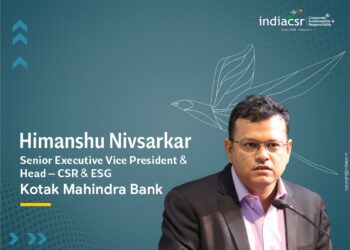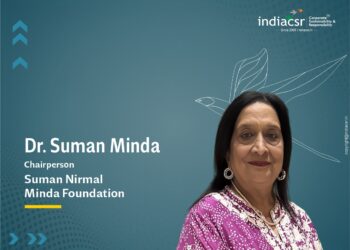NEW DELHI (India CSR): Corporate Social Responsibility (CSR) plays a crucial role in addressing environmental and social challenges, and Sumadhura Group has been at the forefront of sustainable community initiatives. From rainwater harvesting to nutrition programs for underprivileged children, the company’s efforts reflect a deep commitment to environmental conservation and social well-being.
In this exclusive interview, Jeevana Kalakuntla, CSR Head, Sumadhura Group, discusses the impact of their Rainwater Harvesting (RWH) Initiative, which has benefited over 10,000 lives across over 20 communities, and their Sumadhura Poshan Abhiyan, a nutrition program tackling malnutrition among children of migrant workers. She sheds light on the long-term sustainability of these initiatives, the challenges faced, and future expansion plans.
Let’s delve into Sumadhura Group’s impactful CSR journey and explore how corporate initiatives can drive positive change in society.
Your rainwater harvesting initiative has benefited over 10,000 lives and impacted more than 20 communities. What inspired Sumadhura Group to undertake this project, and how do you measure its long-term success?
The launch of the “Free Rainwater Harvesting Wells Desilting Campaign” in Whitefield through our Sumadhura Foundation. This initiative aims to promote sustainable water management practices and contribute to a more water-secure future for our community.
Water scarcity is a pressing issue in urban areas, and as developers, we recognize our responsibility to implement solutions that address this challenge. At Sumadhura Group, our dedication to sustainability and community well-being is at the core of our initiatives. Our desilting program in Whitefield, conducted in collaboration with the Inner Wheel Club Bangalore IT Corridor, is a case in point. The rainwater harvesting initiative, which has positively impacted over 10,000 lives across more than 20 communities, stems from our commitment to environmental conservation and resource efficiency.
As part of this program, over 75 pits have been desilted, significantly improving their percolation efficiency. With the renewed capacity of these recharge pits, we estimate that over 35,859,960 liters of rainwater will be effectively percolated into the groundwater table over the next two years. This initiative plays a crucial role in enhancing the efficiency of existing rainwater harvesting systems, thereby increasing water availability for the community.
Additionally, the renovation of the Government Lower Primary School in Bhoganahalli also made a significant contribution – we installed a rainwater harvesting system and a new RO plant to ensure a constant supply of safe drinking water for the students.
We measure the long-term success of this initiative through several key indicators:
- Monitoring the rise in groundwater tables in areas where our systems are implemented.
- Assessing the decrease in dependence on municipal water supplies among residents.
- Gathering feedback from residents on improved water availability and quality.
- Evaluating the reduction in tanker water dependency during the summer season due to increased groundwater levels in the areas we have served.
These efforts reflect our holistic approach to sustainable development, where environmental responsibility and community enhancement go hand in hand.
How does Sumadhura Group ensure that the benefits of the initiative, such as water conservation and reduced scarcity, are sustained over the long term?
At Sumadhura Group, our commitment to sustainability is core to our operations. We ensure the long-term benefits of our water conservation initiatives through a comprehensive approach:
- Integrated Water Management Systems: At Sumadhura Group, we prioritize the efficient use of water resources by incorporating advanced water management solutions into our projects. Our systems include rainwater harvesting, which captures and stores rainwater for reuse, reducing dependency on external water sources.
- Sustainable Construction Practices: Our buildings are equipped with the necessary green certifications, reflecting the highest standards of sustainable construction practices. We prioritize the use of eco-friendly materials and energy-efficient solutions across all our projects to minimize their environmental impact.[1]
- Community Engagement: We encourage eco-friendly practices among our residents, such as waste segregation and efficient water usage, fostering a culture of sustainability within our communities.
- Ongoing Maintenance and Monitoring: We collaborate with local communities to maintain and enhance rainwater harvesting systems, ensuring their effectiveness over time.
By integrating these practices into our projects and corporate social responsibility efforts, we strive to create resilient communities that prioritize water conservation and environmental stewardship.
What steps has Sumadhura taken to educate communities on the importance of rainwater harvesting and the role they can play in maintaining these systems?
Guided by the mission of “Joy of Sharing,” the Sumadhura Foundation is dedicated to fostering community engagement for the betterment of individuals and society. Through impactful health, skilling and education initiatives, we aim to transform communities, including raising awareness about sustainable practices such as rainwater harvesting. We recognize that the success of rainwater harvesting systems depends not only on their installation but also on the active participation and understanding of the communities they serve. This collective involvement is key to ensuring sustainable water management for the future.
We maintain transparent communication with community members, providing clear information about the benefits and maintenance of rainwater harvesting systems.
Has the initiative led to any unexpected benefits or outcomes for the communities it serves?
Our rainwater harvesting initiatives have yielded several positive outcomes including:
Strengthened Community Engagement: In collaboration with the Inner Wheel Club Bangalore IT Corridor, we successfully carried out a desilting program in Whitefield, clearing over 75 pits in the area. The successful completion of the initiative not only enhanced water management but also made a meaningful contribution to addressing the issue of water scarcity.
Drinking water facilities for students: Our renovation of the Government Lower Primary School in Bhoganahalli included the installation of a rainwater harvesting system and a new RO plant, ensuring a constant supply of safe drinking water. This provided immediate benefits and served as a practical educational tool for students to learn about sustainable water practices.
Enhanced Community Well-being: By ensuring a reliable water supply through rainwater harvesting, we’ve observed improvements in public health and hygiene. Access to clean water has reduced the incidence of waterborne diseases and enhanced the overall quality of life.
Looking ahead, does Sumadhura Group have plans to expand this rainwater harvesting initiative to other regions or introduce similar environmental projects?
Building upon the success of our rainwater harvesting initiatives, we are actively planning to expand these efforts to other regions and introduce similar eco-friendly initiatives.This includesintegration of rainwater harvesting systems into our upcoming projects across various locations.
Beyond rainwater harvesting, we are planning to implement a range of sustainable practices in our developments, such as:
- Waste-to-Energy Recycling Plants: Our projects highlight our dedication to sustainability by converting kitchen waste into energy for the common area.
- Energy-Efficient Solutions: We incorporate energy-efficient appliances, LED lighting, and renewable energy sources like solar panels in our buildings, resulting in up to 15 to 20% savings in overall energy consumption and 30 to 40% savings in common area lighting.
- Open Spaces and Green Architecture: Our projects emphasize open spaces and green architecture, promoting eco-friendly practices by minimizing waste generation, revitalizing water resources, and providing infrastructure to combat water pollution.
Through these initiatives, Sumadhura Group aims to set new benchmarks in environmental responsibility and resource efficiency, contributing to a sustainable future for all.
What inspired Sumadhura Group to undertake this initiative, and how do you measure its long-term success?
Sumadhura Group’s commitment to enhancing the well-being of underprivileged communities is exemplified through their nutrition program initiative, titled Sumadhura Poshan Abhiyan. This endeavor is driven by the belief that access to good health and education can transform lives, enabling individuals to help themselves when provided with these fundamental resources.
The inspiration behind Sumadhura Poshan Abhiyan stems from Sumadhura’s recognition of the challenges faced by children of migrant laborers, who form a significant portion of the workforce in the construction industry. Observations revealed that many of these children, attending government schools, often arrive without having had breakfast. Their parents, due to early work hours, are unable to provide a morning meal, leaving the children to wait until the school’s midday meal, typically served around 12:30 PM. This prolonged period without nourishment hampers their ability to concentrate on their studies, affecting their overall educational experience. Recognizing this pressing issue, Sumadhura initiated the breakfast project to ensure these children receive a nutritious morning meal, thereby enhancing their learning capabilities and overall well-being.
To measure the long-term success of Sumadhura Poshan Abhiyan, the program focuses on tangible outcomes such as improved nutritional status among children and increased awareness of balanced nutrition within the community. By concentrating on balanced nutrition, the program addresses immediate health concerns and contributes to the children’s long-term well-being in project locations. Through these efforts, Sumadhura Group aims to create opportunities that can transform the landscape of India, ensuring that individuals have the good health, education, and safe environment necessary to help themselves and thrive.
How has the Nutrition Program positively impacted the health and academic performance of children in the rural schools you support?
The Sumadhura Poshan Abhiyan has profoundly impacted the lives of children attending the rural schools we support, bringing transformative changes across multiple aspects of their well-being and education. Teachers and headmasters have observed significant health improvements among students, with fewer instances of fatigue and illness. This enhanced physical vitality has created an environment where children are better prepared to learn, thrive, and fully participate in school activities.
The availability of nutritious meals has also led to improved attendance rates. Students are more likely to attend school consistently, knowing they will receive a healthy meal, which has strengthened their readiness to engage in learning each day. Alongside this, teachers have reported that better nutrition has enhanced students’ concentration, participation, and overall learning outcomes. The ability to focus and actively engage in lessons has unlocked new educational opportunities for many children, laying the foundation for brighter futures.
A key element of the Sumadhura Poshan Abhiyan programme is the regular monitoring of children’s physical development through measurements of height, weight, and BMI. This systematic tracking ensures that nutritional needs are being met and enables timely adjustments to meal plans, supporting healthy growth for every child. Beyond health and education, the program has provided vital support for migrant families. By ensuring that children receive breakfast at school, parents with early morning jobs are better-placed to ensure their children get the required nutrition even if they leave for work. This support not only eases their responsibilities but also strengthens their ability to prioritize their children’s education and well-being.
This holistic approach has not only enhanced the health, academic performance, and overall development of the students but has also reinforced community confidence in the value of education as a powerful tool for building a brighter, more sustainable future.
What criteria do you use to select schools and communities for extending your Nutrition Program?
The selection of schools and communities for our Sumadhura Poshan Abhiyan is a carefully planned process designed to ensure that support reaches those most in need and delivers the greatest impact. We begin by working closely with the education department and considering direct requests from headmasters, helping us identify schools where the program would provide the most benefit. Our CSR team then conducts a detailed needs assessment, evaluating each school based on specific criteria and geographical considerations to efficiently allocate resources to underserved areas.
To ensure accountability and maintain the program’s effectiveness, participating schools submit monthly reports that provide critical feedback on implementation and outcomes. These reports guide us in refining our efforts to better serve the students. Beyond addressing immediate nutritional needs, Sumadhura Poshan Abhiyan also supports school infrastructure by renovating kitchens and funding the monthly salaries of kitchen staff as part of our school maintenance project. Additionally, each child receives a serving plate, and schools are provided with plate stands to promote hygiene and instill healthy eating habits. This holistic approach ensures the programme not only addresses nutrition but also fosters a supportive and hygienic environment for learning and growth.
Beyond providing nutritious meals, how does Sumadhura engage with the schools and parents to promote long-term health and well-being among the children?
We take a proactive approach to promoting long-term health and well-being among children by engaging both schools and parents. To ensure the highest standards of food safety, we collaborate with an implementing agency that holds FSSAI certification, guaranteeing that meals meet stringent health and hygiene standards. Additionally, regular surprise visits to schools are conducted to monitor food preparation practices and observe food storage conditions over a 24-hour period, reinforcing accountability and quality control.
Recognizing the importance of awareness and education, we conduct nutrition workshops for both students and parents. These sessions provide valuable insights into balanced diets, healthy eating habits, and the long-term benefits of nutrition. Furthermore, training on food preparation and hygiene ensures that both schools and families are equipped with the knowledge to support healthier lifestyles at home and in educational environments. Through these initiatives, Sumadhura fosters a culture of health and wellness, creating lasting positive impacts on the lives of children and their communities.
What challenges have you faced in implementing the Nutrition Program in rural schools, and how have you overcome them?
Implementing Sumadhura Poshan Abhiyan in rural schools has presented several challenges, each addressed with meticulous planning and unwavering commitment to quality and safety.
1. Sourcing Reliable Vendors for Nutritious Meals:
Ensuring the provision of nutritious meals without compromising on quality was a significant challenge. To overcome this, we conducted extensive evaluations and site visits to potential vendors’ kitchens, ensuring they met stringent safety and quality standards. This rigorous selection process ensured that the meals provided were both healthy and safe for the children.
2. Obtaining Permissions from the Education Department:
Securing the necessary approvals from the education department required adherence to specific guidelines and protocols. We diligently complied with all requirements, ensuring that every suggestion and directive from the department was implemented. This collaborative approach facilitated a smooth approval process and reinforced our commitment to educational standards.
3. Ensuring Food Safety During Transportation:
Maintaining the appropriate temperature of meals during transit was crucial to prevent contamination and preserve nutritional value. To address this, we invested in specialized containers designed to maintain the required temperature until the meals were served, ensuring food safety and quality.
4. Training School Staff for Proper Food Handling:
In the early stages of implementation, training school staff to collect and serve food carefully was essential. We conducted comprehensive training sessions, emphasizing hygiene practices, proper handling, and the importance of maintaining the nutritional integrity of the meals. This training empowered staff to manage the program effectively and ensured the safety and well-being of the children.
By addressing these challenges with diligence and a focus on quality, Sumadhura Poshan Abhiyan has successfully enhanced the nutritional well-being of children in rural schools, fostering a healthier and more conducive learning environment.
How does Sumadhura monitor and evaluate the effectiveness of the Nutrition Program in meeting its objectives?
We employ a comprehensive approach to monitor and evaluate the effectiveness of the Nutrition Program in achieving its objectives, ensuring that it delivers meaningful and measurable outcomes. We gather monthly reports with detailed feedback from parents and school headmasters. These reports offer insights into the program’s impact on students’ health, behavior, and academic engagement, while also highlighting areas for improvement.
Surprise visits by the CSR team are conducted to observe on-ground implementation, assess food preparation and hygiene practices, and ensure adherence to operational guidelines. These visits reinforce accountability and maintain program quality. Regular health check-ups and growth tracking for all students are integral to our evaluation process. By monitoring height, weight, and BMI, we assess the program’s contribution to physical well-being and overall development.
Additionally, we analyze attendance and academic performance data to understand how improved nutrition influences learning outcomes and classroom participation. This multifaceted evaluation strategy allows us to measure the program’s success, make informed decisions, and continuously enhance its effectiveness in fostering healthier and better-performing students.
What role do teachers and school authorities play in supporting the Nutrition Program and ensuring its success?
Teachers and school authorities are pivotal in the success of Sumadhura Poshan Abhiyan. They significantly influence children’s dietary choices, leading to increased consumption of nutritious foods. Additionally, they create supportive environments by ensuring the availability of healthy meals and integrating nutrition into the curriculum. For instance, the Midday Meal Scheme in India relies on teachers to oversee meal distribution and promote hygienic practices, enhancing program effectiveness. Additionally, it ensures that the food provided to the children is both nutritious and well-balanced. By fulfilling these roles, educators contribute to improved student health and learning outcomes.
Are there plans to expand the Nutrition Program to other regions or include additional initiatives such as nutrition education or skill-building workshops for students?
We remain deeply committed to expanding the scope and impact of Sumadhura Poshan Abhiyan. Inspired by the success of the PM Poshan Abhiyan, our Sumadhura Poshan Abhiyan is evolving to reach more communities and address critical nutritional challenges. We are working to extend the program to underserved regions, ensuring that a greater number of schoolchildren and their families receive essential nutritional support. This includes introducing supplements such as nutribars and porridge to further enhance health and wellness outcomes.
Our long-term vision is closely aligned with the goals of Anemia Mukt Bharat, focusing on sustained efforts to promote better health and nutrition among children. As part of this commitment, we recently expanded this Sumadhura Poshan Abhiyan project to Telangana also and we aim to serve approximately 1,000 schoolchildren in the upcoming academic year through the Sumadhura Poshan Abhiyan project. Beyond providing meals, we are exploring opportunities to introduce initiatives such as nutrition education and skill-building workshops. These programs aim to foster a holistic approach to child health and development, equipping students and their families with the knowledge and tools to sustain healthier lifestyles.
These planned expansions reflect our unwavering dedication to nurturing healthier futures for children,while contributing to the well-being and resilience of the communities we serve.
(India CSR)























